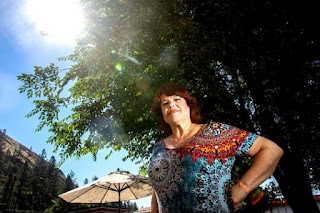" ... 'The word cult conjures a mental picture: a group of beautiful young people dancing trancelike in the sun, probably aspiring actors in Los Angeles who took a wrong turn at the beach and landed in an orgy.'
But that image couldn't be further from the truth and in "Cults Like Us" Borden charts not just the murky history of cult ideologies in America, but how the country remains a breeding ground for cult-like thinking.
"It informs our suppositions about American identity and our very understanding of the immutable self," she writes. "It undergirds every vote, purchase, prejudice, and social-media post. Like fish that don't know water, we swim through it without recognition."
Ever since the Pilgrim Fathers arrived on the Mayflower in 1620 with almost cultish puritanical beliefs, the nation has been susceptible to cult ideologies.
"But their Puritan doomsday beliefs didn't go away; they became American culture," she says."
"Angela and Cade Johnson were married at a laundromat in 2003 when she was 16 and he was 19.
They exchanged vows not by choice, but because the notorious polygamist cult they grew up in — the Fundamentalist Church of Jesus Christ of Latter-Day Saints — forced them to do so.
The cult Angela and Cade were born into made headlines when its infamous "prophet" and leader Warren Jeffs was accused by numerous young victims — including his own children — of molesting them.
Named one of the FBI's Ten Most Wanted after fleeing the cult to avoid arrest, Jeffs, now 69, was finally taken into custody in Las Vegas in 2006. He was convicted five years later of two counts of child sex abuse and sentenced to life in prison.
Because of the tumult in the church at the time, "We didn't have too much to do with him," Angela says. "But if you've ever met him, he's just a creep. Full of arrogance."
She didn't like how girls and teens in the cult were forced to wed men they didn't know. One man she knew had 24 wives."
"Unholy Sensations tells the forgotten but fascinating story of a sex scandal that erupted in the 1890s around a multiracial spiritualist colony called Fountaingrove in northern California. Out of the scandal came a new kind of public menace—what newspapers called the "cult." The Fountaingrove sex scandal helped establish for the first time popular ideas of "cults": groups or movements that violated religious, familial, and sexual norms to such an extent that they seemed dangerous to the dominant moral order. Thomas Lake Harris, the leader of Fountaingrove, became the archetype of the villainous "cult leader," supposedly brainwashing and manipulating his followers through his powerful charisma. The Fountaingrove scandal also established California as a breeding ground for cults, a reputation that remains strong today. Throughout the 1890s, the scandal's twists and turns captivated the public with a volatile mix of sex, religion, and racial exoticism due to the presence of Japanese immigrant men at Fountaingrove. From the Fountaingrove scandal onward, calling a group a cult was to mark it as outside religious, racial, sexual, and gender norms, all at the same time. Unholy Sensations tracks the emergence of the "cult" as a cultural concept while exploring the lived day-to-day realities of the Fountaingrove colonists, their beliefs, and their sexual practices, as well as considering the motives of those who attacked Harris and the colony."
Court rules against Jehovah's Witness appeal to withhold former congregants' personal information.
"An appeal by the Jehovah's Witnesses in Grand Forks over holding the personal information of two former congregation members has been dismissed and is being hailed as a victory for the privacy rights of individuals.
The B.C. Court of Appeal ruled unanimously on March 21, that B.C.'s Personal Information Protection Act (PIPA) did not infringe on the religious freedom rights of two congregations of the Jehovah's Witnesses.
The case started in June 2022, when two former Jehovah's Witnesses requested access to their personal information under the control of the Grand Forks and Coldstream congregations. The congregations and their elders have fought to keep certain information, arguing disclosing these records would violate their Charter right of religious freedom.
An appeal by the Jehovah's Witnesses in Grand Forks over holding the personal information of two former congregation members has been dismissed and is being hailed as a victory for the privacy rights of individuals.
The B.C. Court of Appeal ruled unanimously on March 21, that B.C.'s Personal Information Protection Act (PIPA) did not infringe on the religious freedom rights of two congregations of the Jehovah's Witnesses.
The case started in June 2022, when two former Jehovah's Witnesses requested access to their personal information under the control of the Grand Forks and Coldstream congregations. The congregations and their elders have fought to keep certain information, arguing disclosing these records would violate their Charter right of religious freedom. "
News, Education, Intervention, Recovery
Intervention101.com to help families and friends understand and effectively respond to the complexity of a loved one's cult involvement.
CultRecovery101.com assists group members and their families make the sometimes difficult transition from coercion to renewed individual choice.
CultNEWS101.com news, links, resources about: cults, cultic groups, abusive relationships, movements, religions, political organizations, and related topics.
The selection of articles for CultNEWS101 does not mean that Patrick Ryan or Joseph Kelly agree with the content. We provide information from many points of view to promote dialogue.
Please forward articles that you think we should add to cultintervention@gmail.com.
Thanks,
Ashlen Hilliard (ashlen.hilliard.wordpress@gmail.com)
Joe Kelly (joekelly411@gmail.com)
Patrick Ryan (pryan19147@gmail.com)





